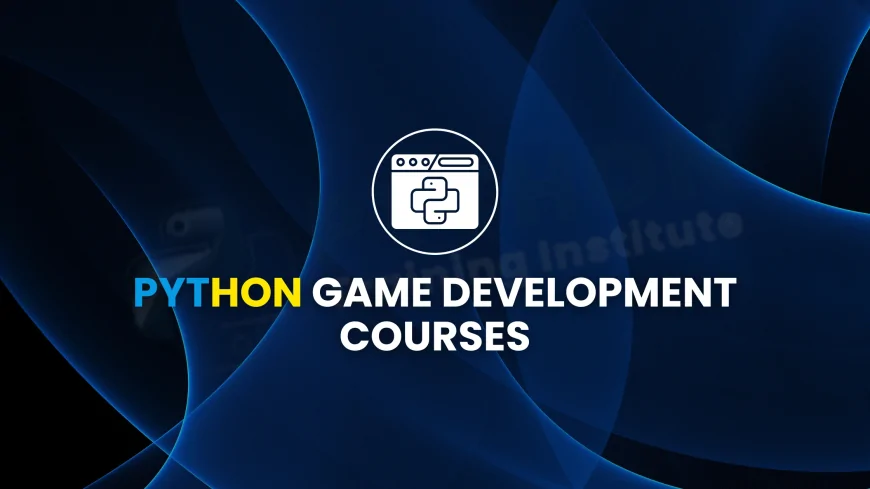Python Game Development Courses in Pune | Python Game Design Training Programs Pune
Explore the best Python game development courses in Pune. Learn game design, Pygame, real-time programming, and build your own games. Enroll in top-rated training with hands-on projects and expert guidance.

Table of Contents
- Introduction
- Why Choose Python for Game Development?
- The Python Game-Dev Ecosystem
- Why Pune Is a Hotspot for Game Development
- Types of Python Game-Dev Courses Available
- Top Institutes & Bootcamps in Pune
- Typical Curriculum & Technologies Covered
- Capstone Projects & Portfolios
- Career Paths & Job Market in Pune
- Certification & Assessment
- Online vs Classroom Learning
- Fees, Duration & Scheduling
- How to Choose the Right Course
- Success Stories of Pune Learners
- Tips to Maximize Your Learning
- Emerging Trends in Python Game Development
- Community, Meetups & Hackathons in Pune
- Internships & Industry Partnerships
- Future Scope & Growth Prospects
- Frequently Asked Questions
- Conclusion
1. Introduction
Pune’s tech-savvy environment, renowned educational institutions, and thriving start-up scene have made it one of India’s fastest-growing game development hubs. Python, celebrated for its low entry barrier and powerful libraries, is a natural first pick for budding developers who wish to step into the exciting world of game programming. This guide dives deep into Python Game Development courses offered across Pune—covering where to learn, what to expect, and how to launch a successful career.
2. Why Choose Python for Game Development?
Python’s readable syntax lets students focus on gameplay mechanics rather than boilerplate code. Popular libraries such as Pygame, Panda3D, Kivy, and frameworks like Godot’s GDScript (Python-like) allow learners to prototype quickly and iterate on ideas without a steep learning curve. Python also integrates seamlessly with C/C++, enabling performance-critical modules for advanced developers.
- Rapid Prototyping: Build playable demos in days, not weeks.
- Extensive Library Support: AI (PyTorch/TensorFlow), networking (Twisted), physics (Pymunk).
- Community Resources: Thousands of tutorials, GitHub repos, and open-source assets.
- Career Flexibility: Skills transfer to web, data science, and automation roles.
3. The Python Game-Dev Ecosystem
A thriving ecosystem sustains Python game development:
- Pygame: 2D graphics, inputs, sound—perfect for arcade, puzzle, and platformers.
- Panda3D: Disney-backed 3D engine used in Toontown Online.
- Kivy: Multi-touch UI—ideal for mobile games.
- Godot (GDExtension / GDScript): Flexibly binds Python for high-performance 2D/3D games.
- PyOpenGL: Direct OpenGL calls for fine-grained control.
Pune institutes often blend these libraries with asset-creation tools (Blender, InkScape) and version control workflows (Git/GitHub), preparing students for real-world pipelines.
4. Why Pune Is a Hotspot for Game Development
Pune hosts over 200 gaming and interactive-tech start-ups, from indie studios to AAA outsourcing companies. Affordable living costs, proximity to Mumbai’s publishing houses, and an academic ecosystem (COEP, MIT-WPU, Symbiosis) funnel a steady talent pipeline. Government initiatives like MAARG Startup Hub and MSInS grants further boost the sector. As a result, specialized Python game-dev courses have proliferated.
5. Types of Python Game-Dev Courses Available
- Short-Term Bootcamps (4–8 weeks): Focus on Pygame fundamentals and a mini-project.
- Comprehensive Diplomas (3–6 months): Cover 2D/3D engines, math for games, AI, and deployment.
- Online Live Cohorts: Weekend / evening batches for working professionals.
- Hybrid Courses: In-person labs plus online theory via LMS platforms.
- Corporate Upskilling Modules: Tailored for studios migrating from C# or C++ to Python toolchains.
6. Top Institutes & Bootcamps in Pune
Based on student reviews, placement stats, and curriculum depth, these Pune providers stand out:
- Webasha Technologies: Full-Stack Python Bootcamp for Beginners
Build complete web apps using Python, Flask, and PostgreSQL. Includes front-end integration and deployment on cloud platforms like Heroku. - Automate tasks using Python libraries such as Selenium, BeautifulSoup, and Pandas. Ideal for engineering students and IT professionals aiming for real-world applications.
Tip: Attend demo classes or download trial LMS modules to evaluate teaching style and project support.
7. Typical Curriculum & Technologies Covered
While syllabi vary, a well-rounded Python game-dev course in Pune usually includes:
- Core Python (OOP, file I/O, data structures)
- Game Loop Architecture & Event Handling
- Pygame & Sprite Management
- Physics (collision detection, Pymunk)
- Basic Linear Algebra & Trigonometry for 2D/3D
- Audio Integration & Visual Effects
- AI for NPCs (state machines, path-finding)
- Networking & Multiplayer Fundamentals (WebSockets, Twisted)
- UI/UX with Kivy or Godot GUI
- Packaging & Publishing to itch.io / Steam
- Version Control, CI/CD, and Agile Workflows
8. Capstone Projects & Portfolios
Recruiters and indie publishers in Pune prioritize portfolios over grades. Quality courses embed at least three graded projects:
- 2D Platformer: Procedural levels, parallax scrolling, and collectibles.
- Turn-Based Strategy Prototype: Tile-map rendering and AI opponents.
- Multiplayer Arcade Shooter: Real-time networking with lobby matchmaking.
Students publish source code to GitHub and executable builds to itch.io, receiving peer feedback before demo day.
9. Career Paths & Job Market in Pune
Python game-dev expertise opens doors to roles such as Gameplay Programmer, Technical Artist, VR Prototype Developer, and Tool Engineer. Pune studios like SuperGaming, 99Games, and June Gaming regularly hire Python-savvy talent for rapid prototyping and backend services. Average starting salaries range from ₹4.5 LPA for freshers to ₹9 LPA for those with solid portfolios.
10. Certification & Assessment
Most institutes issue course completion certificates aligned with the Sector Skill Council for Animation & Gaming. Some, like MIT ADT, include academic credits. Employers value practical demos over certificates, so prioritize institutes that emphasize graded projects and code reviews.
11. Online vs Classroom Learning
| Online | Classroom | |
|---|---|---|
| Flexibility | High – learn at your pace | Fixed schedule |
| Peer Interaction | Virtual forums & Discord | In-person collaboration |
| Hardware Access | Depends on personal rig | High-spec lab machines |
| Cost | 10–20 % cheaper | Higher (infrastructure fee) |
12. Fees, Duration & Scheduling
- Bootcamps: ₹12,000 – ₹25,000 (4–8 weeks)
- Diplomas: ₹35,000 – ₹70,000 (3–6 months)
- Weekend Cohorts: ₹7,000 – ₹15,000
- One-on-One Mentoring: ₹800 – ₹1,200/hour
Most Pune institutes offer EMI options and early-bird discounts in June and December intakes.
13. How to Choose the Right Course
- Clarify your end goal (indie dev vs studio job vs tool developer).
- Inspect the project portfolio of alumni on GitHub.
- Attend a demo session to assess teaching pace.
- Verify mentor credentials and studio experience.
- Check placement assistance track record.
- Compare module depth—does it cover AI, multiplayer, publishing?
14. Success Stories of Pune Learners
- Ria Kulkarni built a Pygame-powered puzzle game during college and secured an internship at SuperGaming.
- Ashwin Patil, a mechanical engineer, shifted careers after completing Webasha’s game-dev diploma and now works as a tool developer in Unity with Python bindings.
- Mital Shah published her horror-adventure game on Steam, grossing ₹5 lakh in the first month, thanks to mentorship from a freelance tutor in Kothrud.
15. Tips to Maximize Your Learning
- Participate in local Game Jams (hosted by COEP and ScreenX).
- Contribute to open-source engines like Pygame-ce to deepen understanding.
- Practice daily “code-kata” challenges targeting gameplay mechanics.
- Maintain a devlog or YouTube channel to document progress; recruiters love transparency.
- Follow Python game-dev subreddits and Discord channels for feedback loops.
16. Emerging Trends in Python Game Development
As graphics engines evolve, Python’s role is expanding into:
- AI-Driven Game Design: Procedural levels using ML agents (TensorFlow with Pygame).
- WebAssembly Ports: Running Python games directly in browsers via Pyodide.
- XR Prototyping: Rapid VR/AR demos with OpenXR Python bindings.
- Cloud Gaming Tools: Python scripts for deploying containers to AWS Gamelift or Azure PlayFab.
17. Community, Meetups & Hackathons in Pune
Pune hosts a vibrant scene:
- Pune Game Developers Meet-up – monthly talks at Creaticity Mall.
- PyCon Pune – tracks on game scripting and Pygame workshops.
- COEP Game Jam – 48-hour competition attracting 50+ teams.
- GDG Pune – cross-language events featuring Godot + Python integrations.
18. Internships & Industry Partnerships
Many institutes partner with local studios:
-
Internships & Industry Partnerships at Webasha Technologies Pune
Webasha Technologies in Pune stands out for its strong industry alignment and commitment to practical training through live internships and real-world projects. Their programs are not just academically solid but also designed to ensure students are job-ready by the end of the course.
Key Internship Highlights:
-
Startup-Focused Internship Opportunities
Webasha collaborates with local tech startups in Pune to place Python learners in fast-paced, project-driven internship environments—ideal for exposure to agile workflows and real product development. -
Industry Projects with Mentorship
Students work on industry-relevant Python projects (such as automation tools, dashboards, chatbots, and web applications) under the guidance of senior developers and project managers. -
Capstone-Based Internships
Every major course ends with a capstone internship where students must design, build, and present a real-world Python solution—backed by mentor reviews and client-style evaluation. -
Collaboration with IT Firms & SMEs
Webasha partners with small and mid-sized enterprises (SMEs), software testing companies, and data consulting firms in Pune for short-term internship placements. -
Certificate of Internship & Experience Letter
Upon successful completion, students receive a detailed internship certificate, experience letter, and recommendation letter, helping them during job applications or further studies.
-
19. Future Scope & Growth Prospects
India’s gaming market is projected to hit $8.6 billion by 2027, and Python’s versatility positions it well for rapid prototyping, AI integration, and backend services. Pune’s upcoming Kharadi Gaming & Animation Cluster promises fresh opportunities for Python-literate game developers.
Frequently Asked Questions (FAQs)
1. Do I need prior programming experience for Python game development courses?
No. Most Pune institutes start with Python basics before moving to game-specific topics.
2. Which is better for beginners: Pygame or Godot?
Pygame is simpler for 2D basics; Godot offers more features for 3D and professional pipelines.
3. How long does it take to build a publishable game?
With consistent effort, a small 2D game can be finished in 8–12 weeks.
4. Are online Python game-dev courses as effective as classroom ones?
Yes—if they include live mentoring, peer code reviews, and project feedback loops.
5. What hardware do I need for course projects?
A quad-core CPU, 8 GB RAM, and a mid-tier GPU (GTX 1650 or RX 570) suffice for most 2D/3D prototypes.
6. Will I learn to publish games on Google Play or Steam?
Comprehensive courses cover store guidelines, APK/EXE packaging, and marketing basics.
7. Do institutes offer job placement assistance?
Many collaborate with local studios, providing interview prep and portfolio showcases.
8. What is the average salary after completing a game-dev course in Pune?
Freshers earn ₹4.5 – ₹6 LPA; experienced developers can exceed ₹10 LPA.
9. Can Python be used for high-performance AAA games?
Python excels in prototyping/tools; performance-critical modules often use C/C++ extensions.
10. Are weekend batches available?
Yes. Evening and weekend cohorts cater to working professionals.
11. Is certification important for securing a job?
Portfolios matter more, but certificates add credibility.
12. Do courses teach multiplayer networking?
Advanced modules cover socket programming, WebSockets, and basic lobby systems.
13. Can I switch to Unity or Unreal after learning Python?
The programming fundamentals transfer easily; you’ll mainly adjust to C# or C++ syntax.
14. Will I receive lifetime access to course material?
Most online platforms grant lifetime video access and code repositories.
15. Are scholarships available?
Some institutes offer merit-based discounts and early-bird deals.
16. Can Python games run on mobile devices?
Yes—Kivy, Godot, and apk-packaged Pygame handle Android/iOS deployment.
17. Do I need to know mathematics for game development?
Basic algebra and trigonometry help with movement and physics.
18. Is Blender taught for asset creation?
Many courses include Blender or partner with design institutes for asset pipelines.
19. How large are typical class sizes?
Bootcamps cap at 15–20 students to ensure individual feedback.
20. What post-course support is offered?
Alumni Slack/Discord groups, code reviews, and periodic portfolio critiques are common.
20. Conclusion
Python game development courses in Pune combine an accessible language with a booming local industry. Whether you prefer a quick bootcamp or a deep-dive diploma, Pune offers varied programs to turn your game ideas into playable realities. Build a robust portfolio, engage with the community, and leverage Pune’s startup ecosystem to transform your passion for games into a rewarding career.
What's Your Reaction?
 Like
0
Like
0
 Dislike
0
Dislike
0
 Love
0
Love
0
 Funny
0
Funny
0
 Angry
0
Angry
0
 Sad
0
Sad
0
 Wow
0
Wow
0















